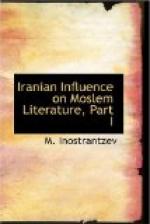[Sidenote: Mobedan-Mobed]
I have read in one of the Books of the Persians that the Mobedan-Mobed in eulogising the art of writing said etc ... (p. 47).
[Sidenote: Epistle of Aberwez.]
I have read in the Epistle of Aberwez to his son Shiruya. [Then follows an advice about severely punishing even a small piece of dishonesty.] (p, 58).
[Sidenote: The Taj.]
I have read in the Taj that Aberwez said to the treasurer [here follows some observations on integrity.]
[Sidenote: Persian sense of justice and equity.]
I have read in the Ain that it behoves the ruler to understand the jurisdiction of rightful justice, of justice which is not equity, of equity which is not justice, and to use his judgment with regard to evidence and eyewitnesses, and to refrain from doubtful matters. Since it is both justice and equity to kill a person for the slaughter of a person, and it is justice without equity to kill a master for the slaughter of a slave, and it is equity without justice to award the same punishment for a crime committed by a sane man as to one who was not in his senses. (p. 88).
And I have read in the Taj: Said Aberwez to his chamberlain; [and here follow very interesting instructions regarding the treatment which the chamberlain was to give to the various persons seeking an audience of the king.] (p. 74).
I have read in the Taj [here follows an address of a secretary to a king.]
[Sidenote: Speech from the throne.]
I have read in the Siyaral Ajam [one of the Arabic versions of Shah Nameh] that Ardeshir, when he was firmly established on the throne, gathered together his subjects and addressed them with eloquence exhorting them to love and obedience to himself, and warning them against sin and dividing the people into four classes, upon which those present made obeisance and their spokesman addressed the king as follows. [Here follows one of those typical speeches of which we have so many in Shah Nameh, and which leaves no doubt that the originals of them were composed in Pahlavi and that they were almost literally translated.]
JAHIZ.
KITAB-AL-BAYAN VA-AL-TABAYYIN.
(Egyptian Edition.)
PART I.
The dictum of BUZURJAMEHR: Buzurg, son of Bokhtagan was asked, “Which is the thing which covers indolence.” “Aye” he said, “Wisdom, which gives beauty to it.” They said, “If a person has got no wisdom?” He said, “Then property, which will cover it.” They said, “But if there is no property?” He said, “His friends will earn respect for him.” They said, “But if he has got no friends to earn respect for him?” He said, “If a person is indolent then he must preserve silence” They said, “But if he does not observe silence?” He said, “Then sudden death is better for him than that he should remain, in the world of the living.” This passage has been repeated at page 123 with a slight difference. There the interrogator is Kisra Anushirvan, and the question is, which thing is the best for a man who is indolent. Buzurg replies, “Wisdom, with which he may be happy.” (p, 4.)




